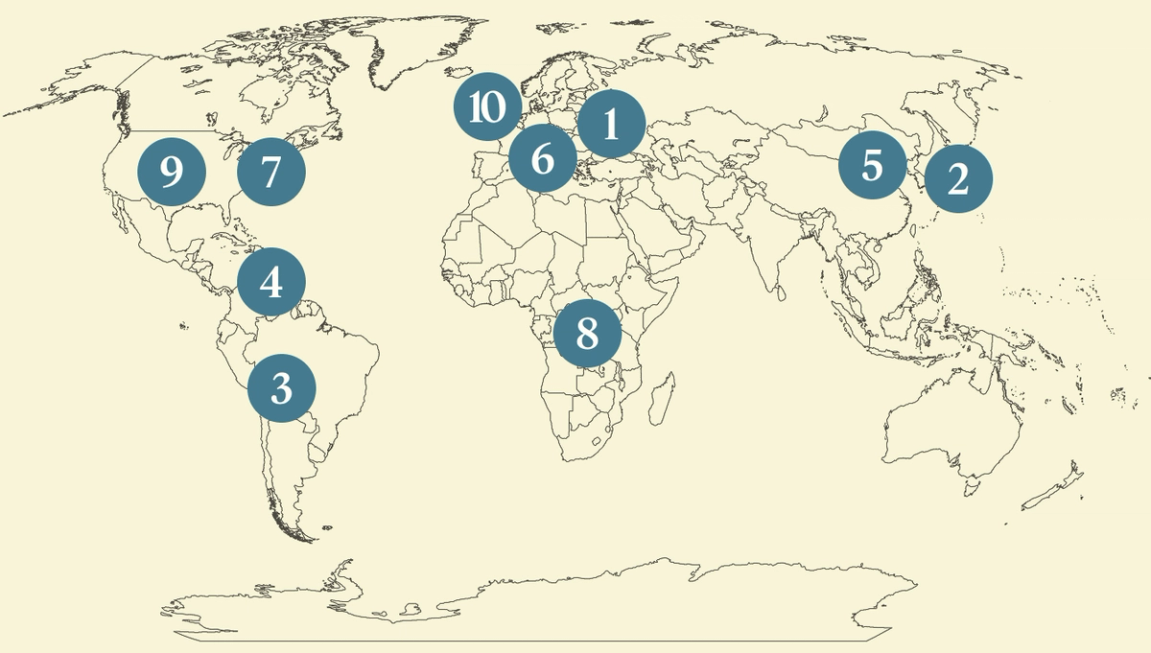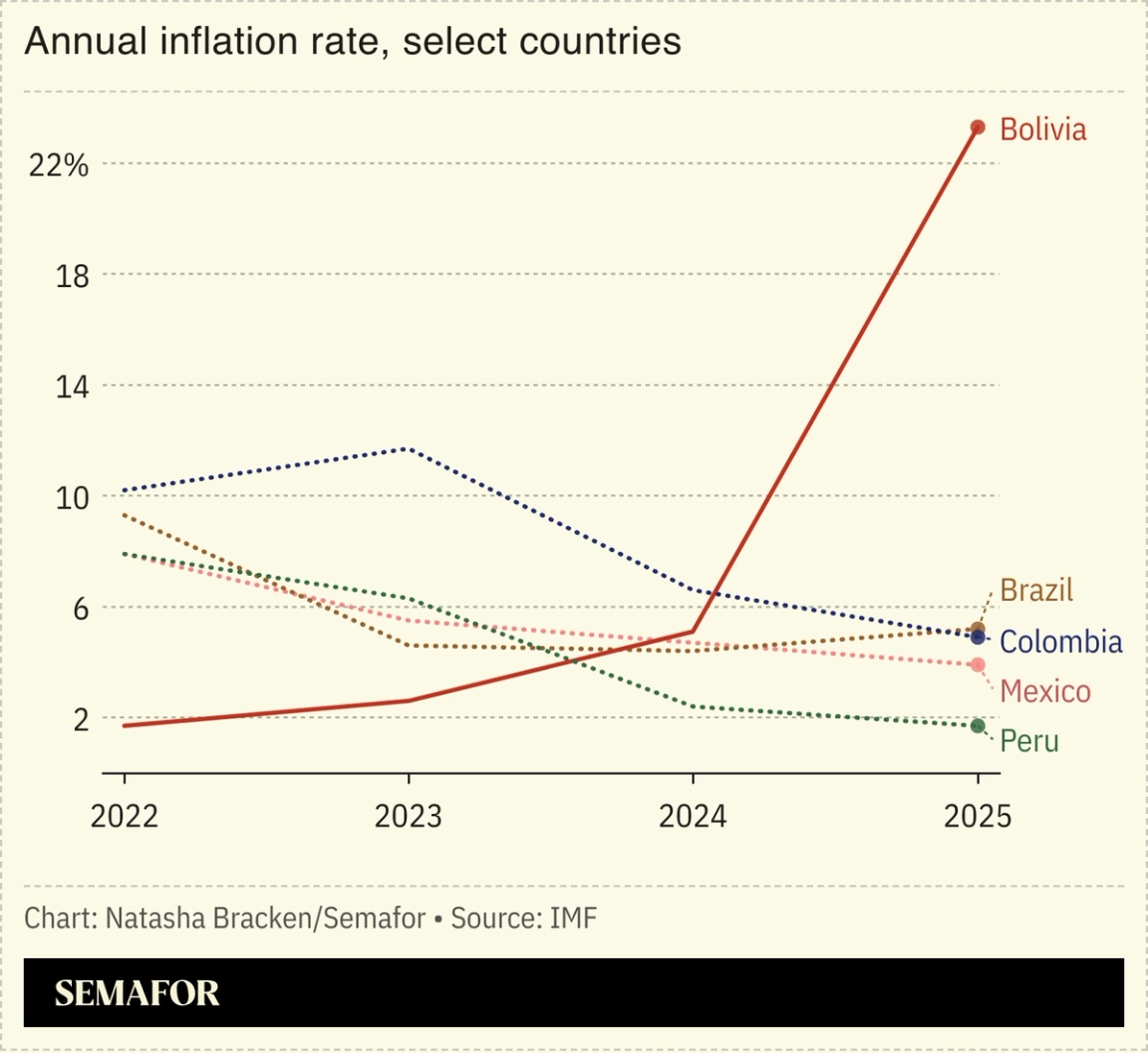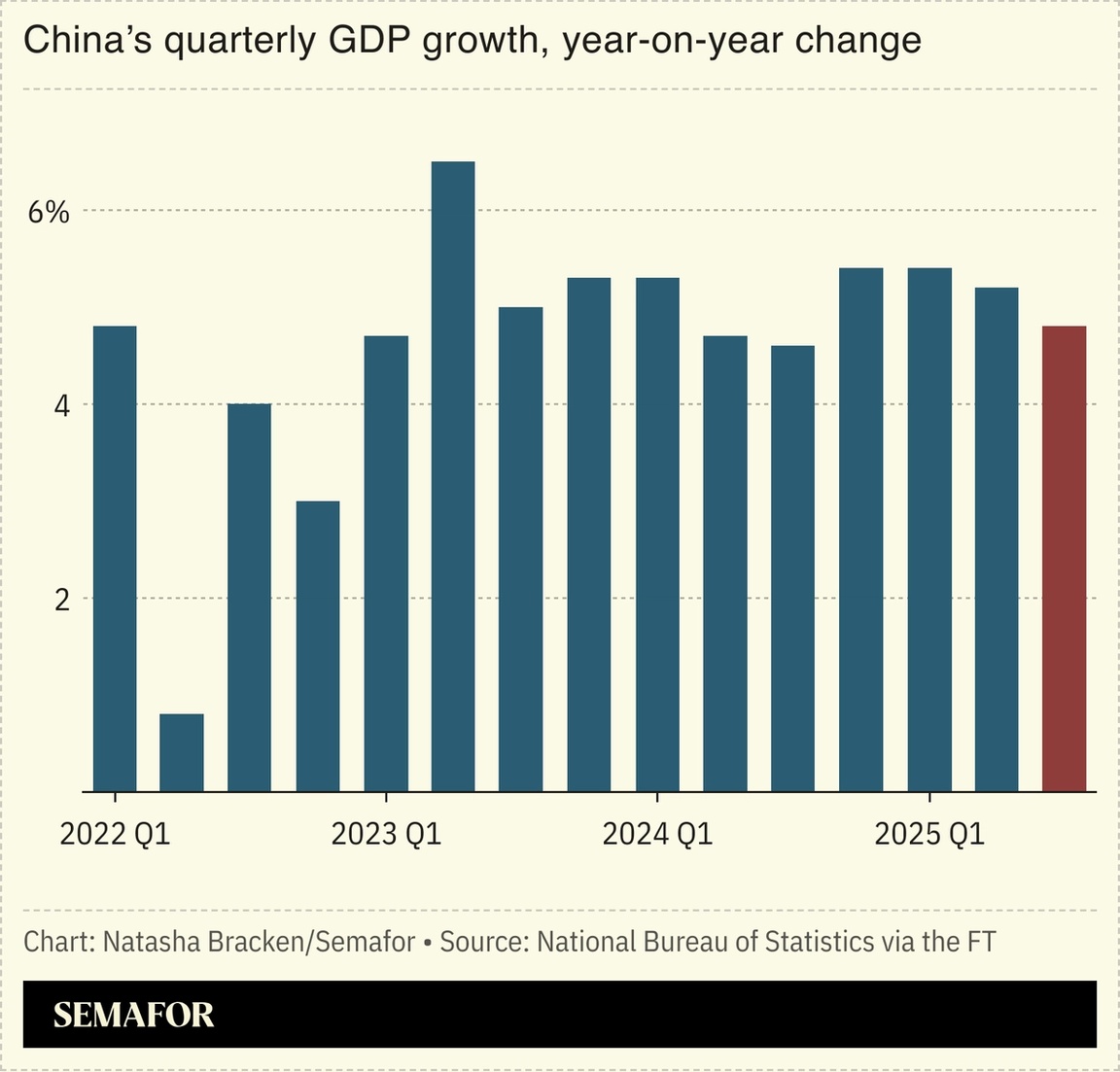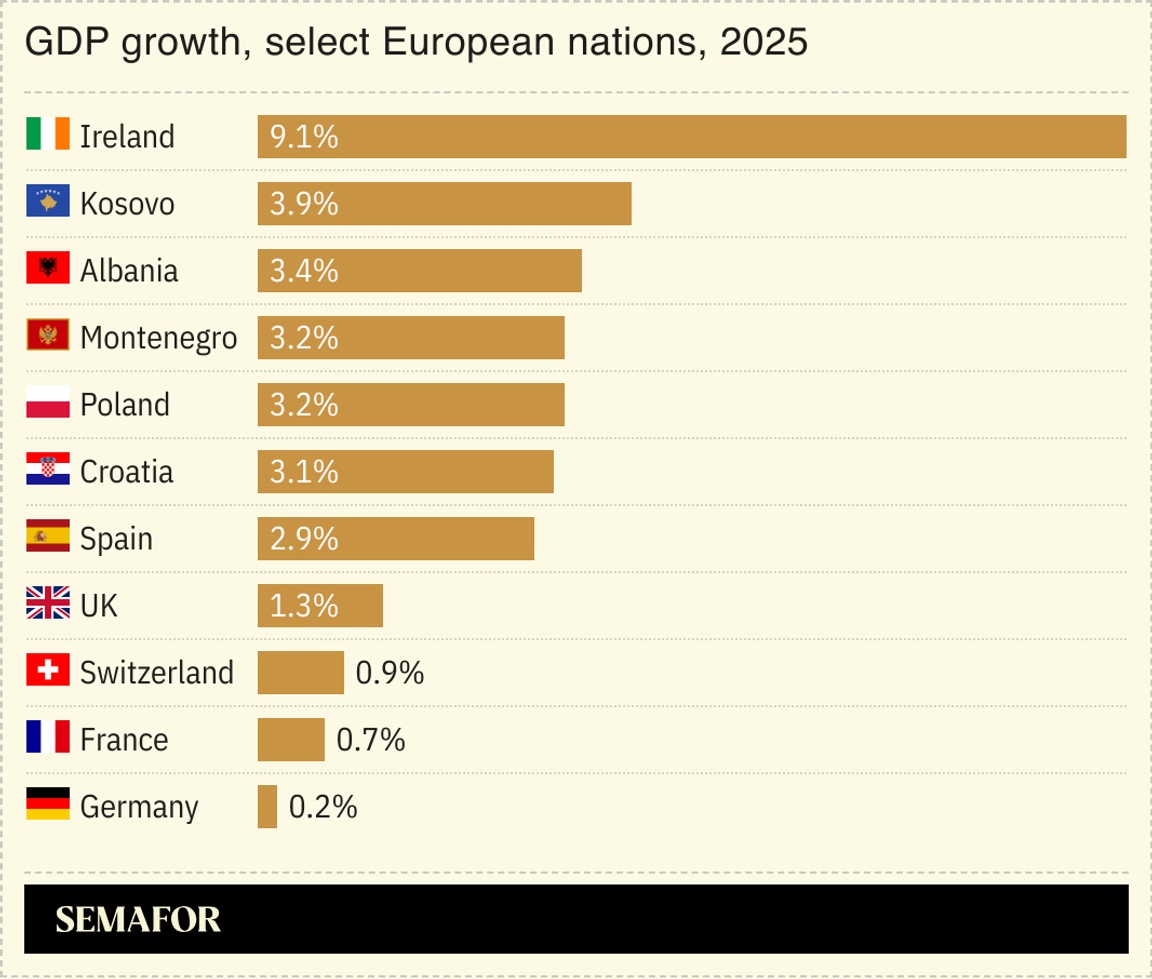| | Trump tells Zelenskyy to cede land to Russia in angry White House meeting, Japan gets close to its f͏ ͏ ͏ ͏ ͏ ͏ |
| |  | Flagship |  |
| |
|
The World Today |  - Trump to Kyiv: Cede land
- Japan could get new PM
- Bolivia elects centrist
- New US Caribbean strike
- China’s good growth news
- France down, Italy up
- Trump sinks shipping tax
- DRC’s last Ebola case
- Peanut allergies down
- Certifying AI-free books
 The London Review of Substacks, and a “strangely compelling” new dance performance from an in-demand choreographer. |
|
 Dear Flagship reader, This weekend marks three years of Semafor. We launched into a disorienting, polarized media landscape, and set out to offer an antidote: Journalism that’s global, transparent, and curious. We wanted to wade through the noise to provide you with rich, concise briefings about an increasingly complex world. Three years in, we’re immensely proud of what we’ve built. Our briefings delve into business, energy, media, and technology, with regional editions focused on Africa, the Gulf, and the US — and more to come, including Semafor China. We’ve broken huge stories and convened agenda-setting gatherings, all in service of delivering intelligence for the new world economy. Flagship is at the core of this mission, to connect the dots and arm you with the knowledge you need to navigate the immense challenges and opportunities around us. Now we’re entering a new phase of growth at Semafor and we’re eager to make Flagship more essential, more sophisticated, more urgent. For that, we need your help: Please write to me and tell me about what you think of us. What do you need in your daily briefing? What could we do better? What do you wish you saw more (or less) of? I’m grateful for your support, guidance, and belief in us. The year ahead will be an exciting one — thank you for joining us along the way. Prashant Rao Senior Editor, Semafor |
|
Trump urges Ukraine to cede land |
 Jonathan Ernst/Reuters Jonathan Ernst/ReutersUS President Donald Trump urged his Ukrainian counterpart Volodymyr Zelenskyy to cede territory to Russia to end the war, during an angry White House meeting last week. Before the leaders met Friday, Trump seemed willing to provide long-range missiles to Kyiv, but pivoted following a conversation with Russian President Vladimir Putin. “With a single phone call, Putin appears to have changed President Trump’s mind,” one source told Politico. His meeting with Zelenskyy was “volatile,” the Financial Times reported. Trump apparently repeated Moscow’s talking points, calling the conflict a “special operation,” not a war, and suggested Russia would “destroy” Ukraine. Putin’s demands have scaled back, however: He proposes drawing borders along existing lines in the war, rather than demanding further territory. |
|
 Sanae Takaichi. Yuichi Yamazaki/Pool via Reuters. Sanae Takaichi. Yuichi Yamazaki/Pool via Reuters.A coalition deal is expected in the Japanese Parliament which would give the country its first female prime minister. Sanae Takaichi was appointed leader of the long-ruling Liberal Democratic Party this month, but failed to win the backing of the party’s usual coalition partner to become PM. The right-wing opposition Ishin party now looks set to support her and she could be appointed tomorrow. Takaichi wants to boost spending and cut taxes, and has criticized rising interest rates; her likely appointment weakened the yen and buoyed Japanese stocks. She is also seeking to revise the country’s pacifist constitution to allow a greater role for its military, and has opposed social policies that include allowing women to keep surnames after marriage. |
|
Bolivia gets new centrist leader |
 Bolivia elected a pro-market centrist on Sunday after two decades of socialist rule. Rodrigo Paz wants to strengthen ties with the US and boost foreign investment in mining of its huge mineral wealth. It’s a major departure for the country: Long-serving former President Evo Morales and his successors courted US adversaries, including China and Iran. But Morales was deposed in 2019 after corruption scandals, and the country has slipped into decline: People queue for days for fuel, The Times of London reported, and food prices have tripled in three years. The new leader faces major challenges: Bolivia’s deficit is 20% of GDP, gas production has halved since 2014, and inflation is at 23%, The Wall Street Journal reported. |
|
US strikes another vessel in Caribbean |
 Eduardo Munoz/Reuters Eduardo Munoz/ReutersThe US struck another vessel in the Caribbean as part of its campaign against drug trafficking, stepping up pressure on Latin American nations. The latest aerial attack — the seventh in a matter of weeks — targeted a Colombian rebel group. It came amid a wider diplomatic row with Colombia in which the White House said it would cut off aid to the country over an alleged failure to curb illegal drug production. Washington also repatriated two purported traffickers to Colombia and Venezuela after their vessel was hit by US forces in the Caribbean, and over the weekend the US urged its citizens in Trinidad and Tobago to avoid American government facilities in the country in a decision linked to persistent efforts to pressure Caracas. |
|
 China’s economy grew slightly faster than expected in the third quarter, fueling cautious optimism that the country will meet its target for expansion. Still, the 4.8% annual growth rate was the lowest in a year, and other data indicated persistent weakness in the world’s second-biggest economy. Retail sales figures were the worst since November, the property market slackened, and analysts said fresh stimulus would be needed in order to ensure the economy grew at the official target of 5% for the year. In further positive signs for the future, US and Chinese officials held trade talks and agreed to resume negotiations to ease their tariff war “as soon as possible,” a sign that whipsawing tensions may be easing. |
|
Europe’s unlikely economic trajectories |
 A credit rating agency downgraded French debt, while another upgraded Italy’s, in another sign that Europe’s traditionally strong economies are on a worrying path compared to some of their historically weaker neighbors. Following a fresh round of political turmoil over a protracted budget crisis in France, S&P said uncertainty over public finances remained high. Meanwhile, DBRS Morningstar said improvements in Italy’s banking system have made it a safer bet. The change should not be overstated — Italy still has a higher debt-to-GDP ratio than France — but the two are on opposite trajectories. Italy, Greece, Portugal, and Spain have all grown faster than Eurozone giants France and Germany in recent months. |
|
Shipping carbon tax in peril |
 Ray Hensel/Handout via Reuters Ray Hensel/Handout via ReutersUS President Donald Trump led diplomatic efforts to quash an EU-led initiative to impose a global shipping carbon tax, putting the emissions-cutting deal on hold for a year. The tax was aimed at incentivizing shifts to cleaner fuels, but Russia, Saudi Arabia, and the US were opposed. Trump called the measure a “Global Green New Scam Tax.” A bad-tempered meeting ended Friday with a decision to freeze the plan until next year, and Washington will now seek to “rally more support to kill it completely,” Politico reported. The US has become increasingly hostile to climate measures — Trump has called climate change a “con job.” International boat shipping accounts for about 3% of total emissions, although it is far more efficient than road haulage in terms of emissions per tonne-kilometer.
|
|
DRC Ebola outbreak could soon be over |
 Zohra Bensemra/Reuters Zohra Bensemra/ReutersThe last known Ebola patient in the Democratic Republic of Congo was discharged from hospital, the UN said. An outbreak was declared in September, with 64 cases confirmed or suspected, and 45 deaths. If there are no new cases for 42 days the outbreak will be considered over, a welcome development after years of conflict between the army and M23 rebels, who recently agreed to a ceasefire monitor. Ebola is endemic in animal populations in much of sub-Saharan Africa, and a combination of hard-to-reach rural areas and burial practices that involve touching of the dead — the virus spreads by fluid contact — make outbreaks potentially devastating. The UN praised the DRC’s “robust response” to the latest flare-up. |
|
|